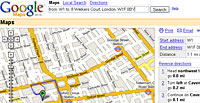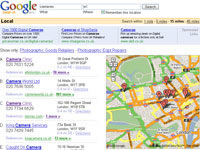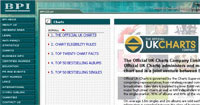 Web search goliaths Google have delivered a large size nine up the rear end of their fierce rivals Yahoo by being the first to launch a local search service in Britain.
Web search goliaths Google have delivered a large size nine up the rear end of their fierce rivals Yahoo by being the first to launch a local search service in Britain.
Like its popular US counterpart, Google’s local search service will offer maps and driving directions, and is their first such offering in Europe.
Now in public beta, the service is offered in partnership with the UK commercial telephone directory company Yell, who provide the business phone numbers and addresses.
Users can find local services by simply typing in their query into two boxes, labelled, “what” and “where”.
For example, typing in ‘cameras’ and ‘W1’ will produce a list of camera shops in the London W1 area, complete with addresses, phone numbers, a map flagging up the locations and a clickable link for more info.
 “It’s the first time we’re bringing local search to a country outside North America,” said Kate Burns, ad sales and operations manager for Google in Britain, declining to give details about launches elsewhere in Europe.
“It’s the first time we’re bringing local search to a country outside North America,” said Kate Burns, ad sales and operations manager for Google in Britain, declining to give details about launches elsewhere in Europe.
The cooperation with a telephone directories company is unique to Britain, Burns said.
Frustrated Frenchmen and befuddled Belgians were left to mull over their fate with this enigmatic statement: “We take our European audience very seriously, (but) we’ve got nothing to announce this time.”
Local search is the big hot potato for Web search providers, who are salivating at the prospect of a nice new advertising niche opening up.
 Global search advertising revenue is already sending cash tills into overdrive, with US investment bank Piper Jaffray estimating spending to rise to US$7.9 billion (£4.1BN/€6bn) in 2005 from US$5.5 billion (£4.1bn/€4.2bn) in 2004 – with most of the growth coming from international expansion and higher volume.
Global search advertising revenue is already sending cash tills into overdrive, with US investment bank Piper Jaffray estimating spending to rise to US$7.9 billion (£4.1BN/€6bn) in 2005 from US$5.5 billion (£4.1bn/€4.2bn) in 2004 – with most of the growth coming from international expansion and higher volume.
Google has also unveiled its Google SMS (Short Message Service) in the UK. This service enables users to send queries as text messages from a mobile phone and get information local business, driving directions and dictionary definitions. There’s also a facility to compare online product prices with high street ones.
Phone users will be charged with normal SMS text tariffs for the service.
 A coalition of government policy makers, technology and broadband companies from China have rocked up to the NAB2005 Media Show in Las Vegas.
A coalition of government policy makers, technology and broadband companies from China have rocked up to the NAB2005 Media Show in Las Vegas. The latest National Statistics monthly update to the survey of Internet Service Providers (ISPs) shows that there was a 1.9 per cent increase in the number of active subscriptions to the Internet in the past year (Feb 2004 – Feb 2005)
The latest National Statistics monthly update to the survey of Internet Service Providers (ISPs) shows that there was a 1.9 per cent increase in the number of active subscriptions to the Internet in the past year (Feb 2004 – Feb 2005) Permanent Internet connections rose to 43 per cent of all subscriptions in February 2005 (up 2 per cent from Jan 2005) with a year on year increase of 85.9 per cent for subscriptions for permanent connections.
Permanent Internet connections rose to 43 per cent of all subscriptions in February 2005 (up 2 per cent from Jan 2005) with a year on year increase of 85.9 per cent for subscriptions for permanent connections. A government-backed study has revealed that more than one in 10 UK teenagers frequently use the Internet to look at “adult-only” Web sites.
A government-backed study has revealed that more than one in 10 UK teenagers frequently use the Internet to look at “adult-only” Web sites. When it came to trusting the media, television was seen as the most trustworthy form of mass communication, with 48% trusting it completely or a lot.
When it came to trusting the media, television was seen as the most trustworthy form of mass communication, with 48% trusting it completely or a lot. Digital document software giants Adobe have announced that it will be buying up rivals Macromedia for about US$3.4 billion (£1.7bn/€2.6) in stock.
Digital document software giants Adobe have announced that it will be buying up rivals Macromedia for about US$3.4 billion (£1.7bn/€2.6) in stock. By combining the passion and creativity of two leading-edge companies, we will continue driving innovations that are changing the ways people everywhere are experiencing and interacting with information.”
By combining the passion and creativity of two leading-edge companies, we will continue driving innovations that are changing the ways people everywhere are experiencing and interacting with information.” Both products have large, loyal user bases and there may be some concern that – in the words of Sparks – “this town ain’t big enough for the both of us”.
Both products have large, loyal user bases and there may be some concern that – in the words of Sparks – “this town ain’t big enough for the both of us”. Last week, 250 executives from advertising agencies, game developers and publishers swarmed into the first annual Advertising in Games Forum on 14 April 2005 in New York City.
Last week, 250 executives from advertising agencies, game developers and publishers swarmed into the first annual Advertising in Games Forum on 14 April 2005 in New York City. For the benefit of buzzword-deficient execs, Yankee Group senior analyst Mike Goodman explained that this hideous word describes what you get when advertisers create a game around a product rather than place their brands within a well-known title.
For the benefit of buzzword-deficient execs, Yankee Group senior analyst Mike Goodman explained that this hideous word describes what you get when advertisers create a game around a product rather than place their brands within a well-known title. Fact-bloated attendees also learned that the top selling 2004 game titles (according to the NPD Group) were:
Fact-bloated attendees also learned that the top selling 2004 game titles (according to the NPD Group) were: Despite being judged the fourth most digitally-savvy nation in Europe, it seems that 40% of the UK adult population don’t know their wi-fi from their waffles.
Despite being judged the fourth most digitally-savvy nation in Europe, it seems that 40% of the UK adult population don’t know their wi-fi from their waffles. A smaller group (15%) expected their usage to increase dramatically in 2005, with the 16-24yr age group expected to increase its usage the most (52%) compared to 34 per cent of the 35-44 age group.
A smaller group (15%) expected their usage to increase dramatically in 2005, with the 16-24yr age group expected to increase its usage the most (52%) compared to 34 per cent of the 35-44 age group. Geographically, London takes the honours as the King WiFi hotspot of the UK with a higher awareness and usage of WiFi (hardly surprising since there are more hotspots in London than anywhere else in the UK) whilst residents oop North in Yorkshire are the least Wi-Fi savvy.
Geographically, London takes the honours as the King WiFi hotspot of the UK with a higher awareness and usage of WiFi (hardly surprising since there are more hotspots in London than anywhere else in the UK) whilst residents oop North in Yorkshire are the least Wi-Fi savvy. A UK train operator has claimed that its passengers will be able to wirelessly access the Internet on all its trains by May 2007 after widespread passenger take-up of the service.
A UK train operator has claimed that its passengers will be able to wirelessly access the Internet on all its trains by May 2007 after widespread passenger take-up of the service. GNER’s chief operating officer Jonathan Metcalfe enthused about onboard Wi-Fi, claiming that it would make the travelling experience “more enjoyable” for consumers and that it would “encourage more people to choose rail instead of driving or flying.”
GNER’s chief operating officer Jonathan Metcalfe enthused about onboard Wi-Fi, claiming that it would make the travelling experience “more enjoyable” for consumers and that it would “encourage more people to choose rail instead of driving or flying.” In a never-ending quest to stem the flow of illegal file sharing, the UK record companies’ trade association, the BPI (British Phonographic Industry), has announced that is taking legal action against another 33 illegal filesharers in the UK.
In a never-ending quest to stem the flow of illegal file sharing, the UK record companies’ trade association, the BPI (British Phonographic Industry), has announced that is taking legal action against another 33 illegal filesharers in the UK. The BPI ramped up the pressure on March 4 this year, declaring that it intended to pursue proceedings against 31 more illegal filesharers. The offenders were sent details of the BPI’s legal claims against them yesterday after their identities were revealed by their Internet service providers.
The BPI ramped up the pressure on March 4 this year, declaring that it intended to pursue proceedings against 31 more illegal filesharers. The offenders were sent details of the BPI’s legal claims against them yesterday after their identities were revealed by their Internet service providers. All of the accused are alleged to have been indulging in an orgy of uploading involving hundreds or thousands of music files illegally and face civil action for an injunction and damages.
All of the accused are alleged to have been indulging in an orgy of uploading involving hundreds or thousands of music files illegally and face civil action for an injunction and damages. A study by Nielsen Entertainment has revealed that men spend more money on video games than they do on music, adding weight to a growing belief that video games are displacing other forms of media for the notoriously fickle attentions of young men.
A study by Nielsen Entertainment has revealed that men spend more money on video games than they do on music, adding weight to a growing belief that video games are displacing other forms of media for the notoriously fickle attentions of young men. Naturally, advertisers are keen to cash in on the rising popularity of games, and are looking at ever more persuasive ways to bombard bedroom-bound, bunglesome boys with beguiling adverts (branded billboards in race games are already commonplace, as we’ve
Naturally, advertisers are keen to cash in on the rising popularity of games, and are looking at ever more persuasive ways to bombard bedroom-bound, bunglesome boys with beguiling adverts (branded billboards in race games are already commonplace, as we’ve  Overall, Nielsen reported that active gamers tend to spend just over 5 hours a week playing alone and 3 hours a week playing with people or online.
Overall, Nielsen reported that active gamers tend to spend just over 5 hours a week playing alone and 3 hours a week playing with people or online.